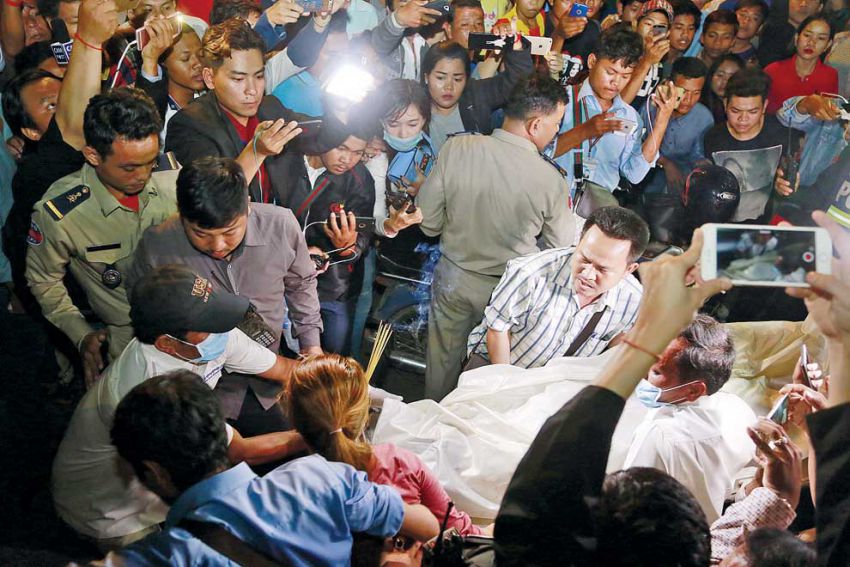
Long Chanthy, mother of San Sreylai, poses with a picture of her daughter at her 100-day funeral ceremony. Sreylai’s death prompted women’s rights activists to speak out about the need to enforce laws on domestic violence. Daphne Chen
The scars criss-cross Long Chanthy’s body, from the back of her hands to the top of her hairline. Six years ago, her husband tried to kill both her and himself in a jealous rage, running away before the authorities could catch him.
To the women in Chanthy’s community, domestic violence has been a part of life. Many of them, including Chanthy’s daughter, were married to men who abused them. However, the 46-year-old never expected that she would be the one to survive, and her daughter to die.
As monks chanted at her daughter’s 100-day funeral ceremony on Saturday, outside the family’s humble home in Sen Sok district, Chanthy wiped away tears with a hand that has been forced into a permanent claw by scar tissue.
“It is the same path,” she said. “It is the same jealousy. And it is a double tragedy.”
To the public, Chanthy’s daughter San Sreylai was a rising star with a charmed life and a Hang Meas TV record deal. To her friends and family, the picture was much more complicated – a hardworking breadwinner who was gunned down by a man who had wielded his power over the family the same way he wielded his gun.
Now, more than three months after the 23-year-old The Voice Cambodia finalist was gunned down by her husband inside a salon in Boeung Keng Kang I, justice seems no nearer.
A promised investigation into a set of grisly photos shared among officers and posted to social media of Sreylai’s body lying in a pool of blood, with her sports bra pulled up to her neck, hasn’t materialised. And women’s rights activists who said they hoped that authorities would take an investigation into the photographs seriously now say that doesn’t appear to have happened.
Phnom Penh Police Commissioner Chuon Sovann, who promised at the time that he would “not tolerate” the leak, could not be reached for comment over multiple days. Phnom Penh Deputy Police Chief Song Ly refused to comment, directing all questions to Sovann.

Members of the media and public crowd around as the body of The Voice Cambodia finalist San Sreylai, fatally shot in October at a beauty clinic by her estranged husband, is loaded into an ambulance.Heng Chivoan
Chantevy Khourn, women’s rights team leader at ActionAid Cambodia, said police must be trusted to follow through on investigations – especially when they are investigating their own force.
“If it is true that no action has been taken against the officers involved, it is a serious failure, not only to bring justice to Sreylai and her family, but also to restore the trust of Cambodian women,” Khourn said in a statement.
Legal expert Sok Sam Oeun said the leakage of the photos could be a criminal act. However, regardless of whether or not someone is eventually charged, “the police must do something so that in the future no such case happens again”, Sam Oeun added.
Chanthy, who called the photos an insult on top of an insult, said police have yet to contact the family about the leak. “They should not do that,” she said. “They should not check my daughter’s breasts. We want to ask, what is the purpose of this?”
However, Chanthy said she is scared to press the issue, afraid of making waves. The family has few resources, and even fewer now that Sreylai is gone. Mother and daughter struggled to make ends meet for years, working in a Poipet nail salon when a local customs official first spotted Sreylai. He was older and a widower. They married when Sreylai was 18 years old.
After the couple had their first child, he became increasingly jealous, according to Chanthy, who said Sreylai’s husband began trying to separate her from friends and family. Even before Srelai went on The Voice, Chanthy said she often witnessed the abuse herself, including the husband brandishing his gun and threatening to kill Sreylai.
“Every time she went to divorce him, he threatened to kill her,” Chanthy said. “We were scared to report it to police because we were scared he would shoot all of us.”

A person watches The Voice Cambodia finalist San Sreylai perform on their smartphone on the day she was killed by her estranged husband in an upscale neighbourhood in Phnom Penh. Heng Chivoan
To women’s rights activists, Sreylai’s case has highlighted the concerns they have been raising for years.
In a report by Licadho released last month, researchers found that Cambodian women often endure abuse for years because they feel they have no option but to remain in violent situations. Many surveyed were not aware of domestic violence shelters or restraining orders, and perpetrators were rarely punished.
Many women interviewed also cited Buddhist beliefs in karma and social harmony as factors influencing them not to report abuse.
Licadho’s Naly Pilorge said domestic violence cases continue to go unreported, making it difficult to tell how commonplace these viewpoints are. However, “the preservation of Khmer culture should not be assimilated to crimes committed against women, children and families”, Pilorge said.
Chanthy said she, too, wonders whether it was always her and her daughter’s fate to suffer – due to bad karma left over from a previous life. Her daughter was still trying to decide whether to divorce her husband when he found her at the salon in BKK1 and killed them both, leaving their 6- and 8-year-old boys parentless.
“You cannot escape this jealousy,” Chanthy said. “We hear of so many husbands killing their wives out of jealousy in our neighbourhood and through Facebook. But I did not believe it could happen to us.”












